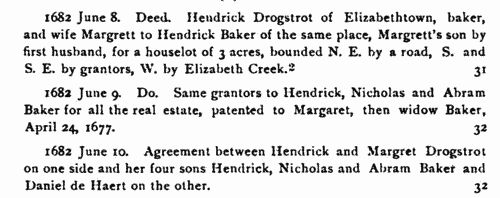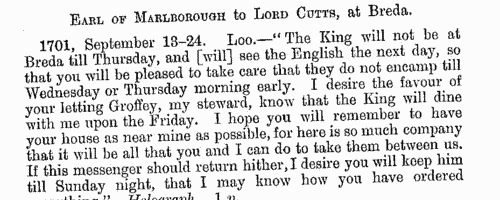Francklen Surname Ancestry ResultsOur indexes 1000-1999 include entries for the spelling 'francklen'. In the period you have requested, we have the following 5 records (displaying 1 to 5): Buy all | | | Get all 5 records to view, to save and print for £20.00 |
These sample scans are from the original record. You will get scans of the full pages or articles where the surname you searched for has been found. Your web browser may prevent the sample windows from opening; in this case please change your browser settings to allow pop-up windows from this site. London Marriage Allegations
(1611-1660)
London, Essex and part of Hertfordshire lay within the diocese of London. In the later 17th century the individual archdeaconry courts issued marriage licences, but for this period the only surviving material is from the overarching London Consistory court. The main series of marriage allegations from the consistory court was extracted by Colonel Joseph Lemuel Chester, and the text was edited by George J. Armytage and published by the Harleian Society in 1887. A typical later entry will give date; name, address and occupation of groom; name, address and condition of his intended bride, and/or, where she is a spinster, her father's name, address and occupation. Lastly we have the name of the church where the wedding was going to take place. For the later years Colonel Chester merely picked out items that he thought were of interest, and his selections continue as late as 1828, but the bulk of the licences abstracted here are from the 17th century.FRANCKLEN. Cost: £4.00.  | Sample scan, click to enlarge

| Allegations for marriages in southern England
(1660-1669)
The province or archbishopric of Canterbury covered all England and Wales except for the northern counties in the four dioceses of the archbishopric of York (York, Durham, Chester and Carlisle). Marriage licences were generally issued by the local dioceses, but above them was the jurisdiction of the archbishop, exercised through his vicar-general. Where the prospective bride and groom were from different dioceses it would be expected that they obtain a licence from the archbishop; in practice, the archbishop residing at Lambeth, and the actual offices of the province being in London, which was itself split into myriad ecclesiastical jurisdictions, and spilled into adjoining dioceses, this facility was particularly resorted to by couples from London and the home counties, although there are quite a few entries referring to parties from further afield. The abstracts of the allegations given here usually state name, address (street in London, or parish), age, and condition of bride and groom; and sometimes the name, address and occupation of the friend or relative filing the allegation. Where parental consent was necessary, a mother's or father's name may be given. The ages shown should be treated with caution; ages above 21 tended to be reduced, doubtless for cosmetic reasons; ages under 21 tended to be increased, particularly to avoid requiring parental consent; a simple statement 'aged 21' may merely mean 'of full age' and indicate any age from 21 upwards. These are merely allegations to obtain licences; although nearly all will have resulted in the issuing of the licence, many licences did not then result in marriage. FRANCKLEN. Cost: £4.00.  | Sample scan, click to enlarge

| Allegations for marriages in southern England
(1679-1687)
The province or archbishopric of Canterbury covered all England and Wales except for the northern counties in the four dioceses of the archbishopric of York (York, Durham, Chester and Carlisle). Marriage licences were generally issued by the local dioceses, but above them was the jurisdiction of the archbishop, exercised through his vicar-general. Where the prospective bride and groom were from different dioceses it would be expected that they obtain a licence from the archbishop; in practice, the archbishop residing at Lambeth, and the actual offices of the province being in London, which was itself split into myriad ecclesiastical jurisdictions, and spilled into adjoining dioceses, this facility was particularly resorted to by couples from London and the home counties, although there are quite a few entries referring to parties from further afield. The abstracts of the allegations given here usually state name, address (street in London, or parish), age, and condition of bride and groom; and sometimes the name, address and occupation of the friend or relative filing the occupation. Where parental consent was necessary, a mother's or father's name may be given. The ages shown should be treated with caution; ages above 21 tended to be reduced, doubtless for cosmetic reasons; ages under 21 tended to be increased, particularly to avoid requiring parental consent; a simple statement 'aged 21' may merely mean 'of full age' and indicate any age from 21 upwards. These are merely allegations to obtain licences; although nearly all will have resulted in the issuing of the licence, many licences did not then result in marriage. FRANCKLEN. Cost: £4.00.  | Sample scan, click to enlarge

| Inhabitants of New Jersey
(1664-1703)
The proprietary government of New Jersey was surrendered to the Crown in 1703. The substantial early records of the colony from 1664 to 1703 were calendared by William Nelson and published by the New Jersey Historical Society in 1899 - East Jersey Libri 1, 3, 4, A, B, C, D, E, F and G; and from West Jersey the registers of New Salem Town Grants, Revel's Book of Survey, Fenwick's Surveys, Salem Surveys, Salem Deeds, Greenwich Town Lote and Gloucester Deeds. The material surveyed includes Indian deeds, patents and other conveyances, confirmatory patents, licences for purchase of lands from the Indians, town charters, court proceedings, military and civil commissions, and allowances of land for immigrant servants; but marriage certificates were omitted from this calendar, being reserved for a separate publication. FRANCKLEN. Cost: £4.00.  | Sample scan, click to enlarge

| Russell family correspondence
(1670-1754)
Mrs S. C. Lomas of the Historical Manuscripts Commission prepared this report on the manuscripts of Mrs Frankland-Russell-Astley of Chequers Court in Buckinghamshire, published in 1900. There are a few items included earlier than 1670, and a few later than 1754, but broadly the collection was divided into three groups: 1. Russell and Frankland correspondence 1657 to 1697; 2. Cutts and Revett papers 1687 to 1708; 3. Colonel Charles Russell's letters 1742 to 1754. Sir John Russell was married to Frances, daughter of Oliver Cromwell; their daughter Elizabeth married sir Thomas Frankland. Their son John Russell, governor of Fort William in Bengal, married as his second wife Joanna (niece of Lord Cutts) widow of colonel Edmund Revett; and John's son, colonel Charles Russell married Colonel Revett's daughter, Mary Joanna. The largest part of this collection is the correspondence of Colonel Russell, of the 1st Regiment of Foot, and later of the Coldstream Guards, soldiering in the Netherlands.FRANCKLEN. Cost: £4.00.  | Sample scan, click to enlarge

|
Research your ancestry, family history, genealogy and one-name study by direct access to original records and archives indexed by surname.
|







